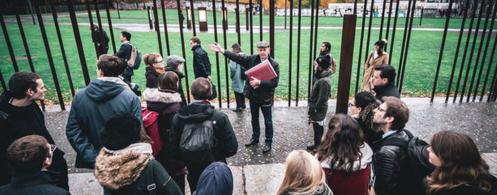
By Ana Vasconcelos Martins and Sophie L. Vériter
Research Assistants, Europe’s Stories, Dahrendorf Programme, European Studies Centre, University of Oxford
Narratives, elusive as though they may be, are powerful forces of history that shape events as much as events shape them. At a moment when Europe faces many challenges – economic, social, environmental, political, even existential and foundational – the stories which Europe tells now will determine what it will become in ten years’ time, and beyond. Hence the importance of understanding the main narratives that are paving the future that Europe is headed towards.
On its 10th Anniversary Conference in May 2019, the Dahrendorf Programme for the Study of Freedom officially launched the Europe’s Stories project, which is funded by the Mercator foundation, the ZEIT foundation and the Friedrich Naumann foundation. The project aims to capture the stories Europe does and should tell, as well as what Europeans want the EU to do going forward.
As Professor Timothy Garton Ash, Europe’s Stories director, noted at the time, there are potentially as many European stories as there are Europeans. Yet, no matter how many unique moments shape each individual’s narrative, there are past moments, present concerns, and hopes for the future of Europe that are transversal to the experiences of Europeans from across the continent.
Research & events
Our team of more than 20 researchers from across Europe has set out to pin down the defining moments and aims that constitute Europe’s stories by combining the following research methods:
- Qualitative interviews with, and self-interviews by, people from different generations, places and social backgrounds, as well as experts from various subject areas;
- Opinion polling on EU policy preferences in partnership with the eupinions project of the Bertelsmann Foundation;
- Secondary research: data gathered from other normative, descriptive and analytical projects as well as interactive initiatives such as websites, podcasts and movements relating to the Europe’s Stories’ topic areas.
Since the 10th Anniversary Dahrendorf Conference, during which the project’s research focus was debated among specialists from fields as different as Politics and Theatre, our team has also organised a conference with ‘post-89ers’ (those born roughly between 1980 and 2000) in partnership with the Mercator Foundation in Berlin, where we carried out deliberative polling on Europe’s Stories core questions. We also conducted two workshops with high school students in Germany, where generational attitudes regarding the future of Europe were discussed. These events provided insights and feedback that proved crucial to the design of our ongoing research.
Key preliminary findings
Our interviewees answer a set of six questions about the moments they consider most significant in their experience of Europe. Based on the first 117 of these ongoing interviews, all of which can be viewed on the Europe’s Stories website, personal experiences such as studying and travelling abroad tend to be more formative than particular historic events. Correspondingly, freedom of movement leads as the single most important thing that the majority of interviewees say Europe has done for them personally. Most interviewees, in the UK and in other European countries, consider Brexit the worst moment in recent European history. Many, especially Eastern Europeans, name the Eastern Enlargement of 2004 as their best European moment.
Addressing climate change is the most popular answer to the interviews’ final question about the one thing our respondents would like the EU to have achieved by 2030. This finding partly informed the questions we put to Europeans in our first specially commissioned opinion poll about EU policy preferences. Aside from climate change policy, we also asked people’s opinions on jobs and social security. From that survey of more than 12,000 respondents between the ages of 16 and 69 in all 27 EU member states and the UK, two of our most remarkable findings reported were: (a) ‘71% of Europeans are in favour of a universal basic income (UBI)’; and (b) ‘53% of young Europeans think authoritarian regimes are better equipped to address the climate crisis’. This poll was conducted by our partner eupinions between 5 and 25 March 2020, thus likely reflecting the impact of the pandemic on our respondents’ concerns.
